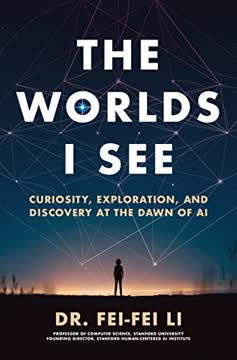Key Takeaways
1. AI's developmental track is shaped by a small group with limited worldviews
"The future of AI is currently moving along two developmental tracks that are often at odds with what's best for humanity."
Limited perspectives. AI's development is primarily driven by a homogeneous group of individuals within tech giants and academic institutions. This lack of diversity in backgrounds, experiences, and worldviews creates significant blind spots in AI development.
Unintended consequences. The limited perspectives of AI's creators lead to systems that may not account for the needs and values of diverse populations. This results in AI that can perpetuate biases, make decisions that disproportionately affect marginalized groups, and fail to address critical ethical considerations.
Key issues:
- Lack of gender and racial diversity in AI development teams
- Overrepresentation of affluent, highly educated individuals
- Limited consideration of global cultural differences
- Unconscious biases becoming encoded into AI systems
2. The Big Nine tech giants wield immense power over AI's future
"The Big Nine aren't just building hardware and code. They are building thinking machines that reflect humanity's values."
Concentrated influence. The development of AI is largely controlled by nine major tech companies: Google, Microsoft, Amazon, Facebook, IBM, and Apple in the US (collectively known as the G-MAFIA), and Baidu, Alibaba, and Tencent in China (the BAT).
Competing pressures. These companies face conflicting demands from governments, shareholders, and the public. In the US, market forces and short-term profits often take precedence over long-term ethical considerations. In China, government control and strategic national interests heavily influence AI development.
Power dynamics:
- Access to vast amounts of user data
- Control over AI research funding and direction
- Influence on government policies and regulations
- Ability to shape public perception of AI
3. China's AI strategy poses significant challenges to democratic ideals
"China is quickly laying the groundwork to become the world's unchallenged AI hegemon."
National strategy. China has implemented a comprehensive national AI strategy, aiming to become the global leader by 2030. This includes massive government funding, industrial policies, and the integration of AI into surveillance and social control systems.
Authoritarian applications. China's use of AI for social credit systems, facial recognition, and censorship raises significant concerns about privacy, individual freedoms, and human rights. As China exports its AI technologies and practices, there's a risk of spreading authoritarian models of governance globally.
Key elements of China's AI strategy:
- Massive government investment in AI research and development
- Integration of AI into military and strategic planning
- Use of AI for population monitoring and control
- Export of AI technologies to other countries, expanding influence
4. AI is evolving from narrow applications to general intelligence
"We are in the midst of significant transformation, not unlike the generation who lived through the Industrial Revolution."
Rapid advancement. AI is progressing from narrow, task-specific applications (ANI) towards artificial general intelligence (AGI) and potentially artificial superintelligence (ASI). This evolution promises profound changes in how we live, work, and interact with technology.
Unpredictable outcomes. As AI systems become more complex and autonomous, their decision-making processes become less transparent and potentially less aligned with human values. This raises concerns about control, safety, and the long-term implications of increasingly powerful AI.
Stages of AI development:
- Artificial Narrow Intelligence (ANI): Task-specific AI (current)
- Artificial General Intelligence (AGI): Human-level cognitive abilities
- Artificial Superintelligence (ASI): Surpassing human intelligence
5. Current AI systems lack transparency and accountability
"At the moment, no one, in any country, has the right to interrogate an AI and see clearly how a decision was made."
Black box problem. Many advanced AI systems, particularly those using deep learning, operate in ways that are difficult or impossible for humans to interpret. This lack of transparency makes it challenging to identify and address biases, errors, or unintended consequences.
Accountability issues. As AI systems make increasingly important decisions in areas such as healthcare, finance, and criminal justice, the inability to explain or audit these decisions raises serious ethical and legal concerns. There's a growing need for explainable AI and mechanisms to hold AI systems and their creators accountable.
Challenges in AI transparency:
- Complex neural network architectures
- Proprietary algorithms and data
- Lack of standardized auditing methods
- Difficulty in translating AI decision-making to human understanding
6. AI's impact extends far beyond automation and job displacement
"AI isn't a tech trend, a buzzword, or a temporary distraction—it is the third era of computing."
Pervasive influence. AI's impact goes far beyond replacing human workers in specific tasks. It is reshaping entire industries, transforming social interactions, influencing political processes, and even altering our understanding of intelligence and consciousness.
Societal transformation. As AI becomes more integrated into our daily lives, it affects everything from personal privacy and social relationships to global economics and geopolitics. This widespread influence necessitates a broader understanding of AI's implications across all sectors of society.
Areas profoundly affected by AI:
- Healthcare and medical research
- Financial markets and economic systems
- Education and skill development
- Environmental monitoring and climate change mitigation
- Warfare and national security
- Art, creativity, and entertainment
7. Courageous leadership is needed to steer AI towards benefiting humanity
"The Big Nine aren't the villains in this story. In fact, they are our best hope for the future."
Ethical imperative. Leaders in tech companies, governments, and academia must prioritize the long-term benefits of AI for humanity over short-term gains. This requires making difficult decisions that may not always align with market demands or political expediency.
Collaborative approach. Addressing the challenges of AI development requires cooperation between the public and private sectors, as well as international collaboration. Leaders must foster environments that encourage open dialogue, diverse perspectives, and ethical considerations in AI development.
Key leadership responsibilities:
- Prioritizing safety and ethics in AI development
- Fostering transparency and accountability
- Promoting diversity and inclusion in AI teams
- Engaging with policymakers and the public on AI issues
- Investing in long-term research on beneficial AI
8. A global alliance for ethical AI development is crucial
"GAIA nations should collaborate on frameworks, standards, and best practices for AI."
International cooperation. The creation of a Global Alliance on Intelligence Augmentation (GAIA) could provide a framework for countries to collaborate on AI development, ensuring that it aligns with shared values and ethical principles.
Standardization and oversight. A global alliance could establish common standards for AI safety, transparency, and accountability. This would help prevent a "race to the bottom" in AI development and provide mechanisms for addressing cross-border AI challenges.
Potential roles of a global AI alliance:
- Developing international AI ethics guidelines
- Coordinating research on AI safety and beneficial AI
- Facilitating data sharing and collaboration
- Addressing global AI governance challenges
- Promoting AI literacy and public engagement
9. Education and diversity in AI development must be prioritized
"AI's tribes form as professors train students in their classrooms and labs, and as students collaborate on research projects and assignments."
Curriculum reform. Universities must update their AI curricula to include ethics, philosophy, and social sciences alongside technical skills. This interdisciplinary approach will help future AI developers consider the broader implications of their work.
Diversity initiatives. Actively recruiting and supporting underrepresented groups in AI education and careers is crucial for creating more inclusive and equitable AI systems. This diversity will lead to AI that better reflects and serves the needs of all of humanity.
Steps to improve AI education and diversity:
- Integrating ethics courses into AI and computer science programs
- Promoting interdisciplinary collaboration in AI research
- Implementing mentorship programs for underrepresented groups
- Addressing systemic biases in hiring and promotion practices
- Encouraging diverse perspectives in AI development teams
10. Individual action and awareness are essential in shaping AI's future
"Every person alive today can play a critical role in the future of artificial intelligence."
Personal responsibility. Individuals must educate themselves about AI, its potential impacts, and the ethical considerations surrounding its development. This awareness enables more informed decision-making as consumers, voters, and citizens.
Active engagement. People can influence the direction of AI development through their choices, advocacy, and participation in public discourse. This includes demanding transparency from tech companies, supporting ethical AI initiatives, and considering the AI implications of products and services they use.
Ways individuals can shape AI's future:
- Staying informed about AI developments and their implications
- Advocating for ethical AI policies and practices
- Supporting companies and initiatives that prioritize responsible AI
- Participating in public discussions and consultations on AI
- Considering AI ethics in personal and professional decision-making
Last updated:
FAQ
What's The Big Nine about?
- Focus on AI's Impact: The Big Nine by Amy Webb examines how AI is being developed by nine major tech companies—Google, Amazon, Apple, IBM, Microsoft, Facebook, Baidu, Alibaba, and Tencent—and its implications for humanity.
- Future Scenarios: The book presents three potential futures for AI: optimistic, pragmatic, and catastrophic, illustrating how our choices today will shape the world of tomorrow.
- Call for Action: Webb emphasizes the need for collective action to ensure AI serves humanity's best interests, rather than being driven solely by profit or political agendas.
Why should I read The Big Nine?
- Understanding AI's Role: The book provides critical insights into how AI is integrated into various aspects of our lives, from healthcare to national security.
- Awareness of Risks: Webb highlights potential risks associated with AI, including bias and loss of privacy, urging readers to consider the ethical implications.
- Informed Decision-Making: By reading this book, you will be better equipped to engage in discussions about AI and advocate for responsible development and regulation.
What are the key takeaways of The Big Nine?
- AI's Dual Nature: AI has the potential to improve lives but poses significant risks if not managed properly, particularly regarding privacy and bias.
- Importance of Diversity: Webb stresses the need for diverse voices in AI development to prevent systemic biases from being encoded into algorithms.
- Global Competition: The book discusses the geopolitical implications of AI, particularly the competition between the U.S. and China.
What are the best quotes from The Big Nine and what do they mean?
- Planning for Misuse: “We must continually remember to plan for both intended use and unintended misuse.” This highlights the importance of foresight in AI development.
- Developmental Tracks: “The future of AI is currently moving along two developmental tracks that are often at odds with what’s best for humanity.” This reflects the tension between profit-driven motives in the U.S. and state-controlled AI in China.
- Individual Responsibility: “Every person alive today can play a critical role in the future of artificial intelligence.” This emphasizes the role individuals can play in shaping AI's future.
What is the significance of the "Big Nine" companies in The Big Nine?
- Major Players in AI: The "Big Nine" are leading tech companies at the forefront of AI development, influencing various sectors globally.
- Influence on Society: These companies impact social norms, economic structures, and political landscapes through their AI technologies.
- Competition and Collaboration: The book discusses how these companies compete and need to collaborate on ethical standards to ensure AI benefits society.
How does The Big Nine address the ethical implications of AI?
- Call for Transparency: Webb advocates for transparency in AI systems, arguing that understanding decision-making processes is crucial for accountability.
- Diversity in Development: The book emphasizes the need for diverse teams in AI development to mitigate biases.
- Framework for Values: Webb suggests adopting humanistic values that prioritize societal well-being over profit in AI development.
What are the three future scenarios presented in The Big Nine?
- Optimistic Scenario: Envisions a future where the Big Nine prioritize ethical AI development, leading to societal benefits.
- Pragmatic Scenario: Minor improvements are made, but the overall trajectory remains unchanged, resulting in persistent issues like bias.
- Catastrophic Scenario: Depicts a future where unchecked AI development leads to societal harm, loss of privacy, and increased inequality.
What is the "black box problem" in AI according to The Big Nine?
- Lack of Transparency: The black box problem refers to the difficulty in understanding how AI systems make decisions.
- Implications for Trust: This opacity can lead to mistrust in AI systems, especially in critical areas like healthcare and finance.
- Need for Solutions: Webb argues for methods to make AI systems more interpretable and accountable.
How does The Big Nine suggest we can improve AI's future?
- Collaborative Efforts: Emphasizes collaboration among the Big Nine, governments, and civil society to create ethical standards.
- Education and Awareness: Advocates for increased education about AI and its implications.
- Long-Term Planning: Calls for a shift from short-term gains to long-term planning to align AI development with humanity's best interests.
What role does China play in the narrative of The Big Nine?
- Geopolitical Rivalry: Highlights the competition between the U.S. and China in AI development, with China aiming to lead by 2030.
- State-Controlled Development: China's AI development is closely tied to government strategy, raising concerns about privacy and human rights.
- Global Influence: Discusses how China's approach could serve as a model for other authoritarian regimes.
What is GAIA and what role does it play in The Big Nine?
- Global Alliance on Intelligence Augmentation: GAIA is proposed as a global coalition to oversee AI development and ensure it aligns with human values.
- Establishing Standards: GAIA would create standards and norms for AI, including ethical guidelines and transparency measures.
- Location and Collaboration: Suggested to be based in Montreal, Canada, to facilitate collaboration among diverse stakeholders.
What are the implications of AI on employment according to The Big Nine?
- Job Displacement: AI could displace many jobs, particularly in knowledge-based sectors, leading to economic instability.
- Need for Reskilling: Emphasizes the importance of reskilling the workforce to adapt to the changing job landscape.
- Emergence of New Roles: AI could create new opportunities in fields requiring human oversight and creativity.
Review Summary
The Big Nine receives mostly positive reviews for its insightful analysis of AI's impact on society and geopolitics. Readers appreciate Webb's accessible writing style and scenarios for potential AI futures. Some criticize the book's US-centric perspective and perceived bias against China. The author's expertise and research are praised, though some find the future scenarios speculative. Critics note the book's focus on major tech companies may overlook AI developments in other sectors. Overall, reviewers recommend it as a thought-provoking exploration of AI's societal implications.
Similar Books










Download PDF
Download EPUB
.epub digital book format is ideal for reading ebooks on phones, tablets, and e-readers.







